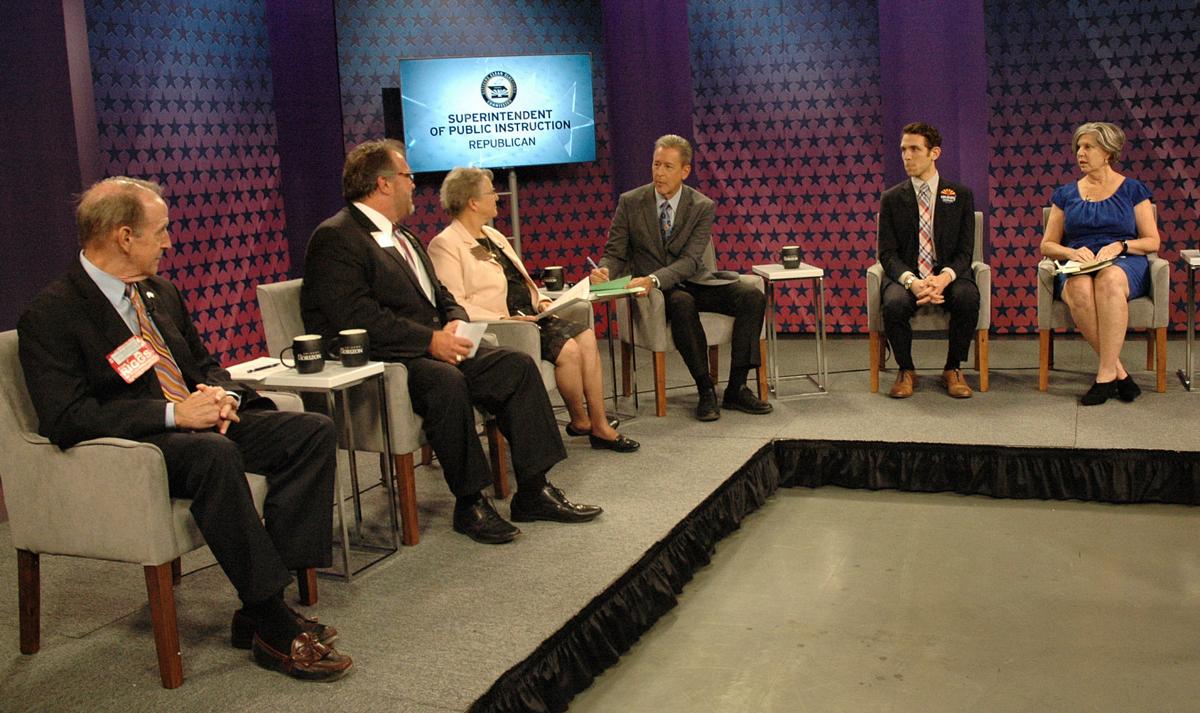PHOENIX — Three of the Republicans hoping to be state school superintendent want students exposed to and taught “intelligent design,” but not necessarily as part of the science curriculum.
“I personally believe in intelligent design,” said Bob Branch who educates teachers at two different Christian universities. And Branch said looking through a microscope at elements shows “there’s architect and there’s design.”
“I’m not saying that we have to put it in terms of was there creationism,” he said during a televised debate Wednesday among all the Republican contenders. But Branch said schools should be able to teach it.
“Intelligent design” is a theory that essentially says life is too complex to have evolved at random and must be the product of some specific design, presumably by a higher power.
The issue has taken on importance since incumbent schools chief Diane Douglas this year proposed changes in high school science standards to remove some references to “evolution” and require elsewhere that it be taught only as theory.
“I personally believe that there is a place for intelligent design in instruction,” Douglas said at the debate. She said the standards are being written “to allow our students to learn all the truths about evolution,” saying there is not just one theory.
But Douglas, who came under some criticism for the proposal, said she believes the state Board of Education, which has the final say, will put various “theories of the creation of the universe” instead into courses on world religions.
That is the path suggested by former California Congressman Frank Riggs.
“The scientific theory of evolution belongs in biology or anthropology classes,” he said. But Riggs’ position also has a religious spin of sorts in what students should learn.
“They absolutely have to learn that our Founding Fathers believed in a Creator, they put it in the Declaration of Independence,” Riggs continued. And all that — including the concept of intelligent design — should be taught in history and government classes.
And Riggs said after the debate that means having one theory taught in science class and another in civics.
“That’s what education’s about, right?” he said.
Tracy Livingston, a public school teacher, said students need to learn “the scientific theories of evolution.”
But Livingston, who is on the board of the Maricopa Community Colleges, sought to minimize the impact of any change. She said even if the standards are changed, teachers will still teach evolution to their students.
Jonathan Gelbart, who worked as director of charter school development for BASIS charter schools, agreed.
“Science classes should be reserved for science,” he said.
Gelbart said if schools want to tell students about religious theories of how life on Earth evolved, that should be reserved for history or literature classes.
Much of the hourlong debate at KAET-TV, the Phoenix PBS affiliate, had the incumbent Douglas on the defensive.
“We can’t afford four more years of a failed and ineffective incumbent,” said Riggs.
Livingston said she voted for Douglas in 2014. But now, she said, the Department of Education that Douglas runs is “a bloated, out-of-touch area.”
Gelbart said Douglas is at least partly to blame for a federal audit that found her agency had used an incorrect formula to give federal dollars to Title I schools — those with a higher percentage of students from low-income households — that resulted in a mistake of $85 million.
Worse yet, he said, the problem was known in 2015 but wasn’t made public until two years later.
“Anybody can get up here and say anything based on whatever they think their evidence is,” Douglas responded.
She said her agency was implementing formulas that had been around for years before she took office.
And Douglas said she brought in auditors “to make sure all the errors of the past had been corrected.”
Douglas also sought to deflect criticism by some of her foes that she was not an active player in education policy and did not use her “bully pulpit” to advocate.
She pointed out that she was the only elected statewide official who came up with a plan to boost the state sales tax by four-tenths of a percent, a move she said would have, by itself, provided a guaranteed source of dollars for an 11 percent increase in teacher pay. And that was proposed long before Gov. Doug Ducey came up with his plan to boost teacher pay by 19 percent by 2020, though there is no new revenue source to fund it.
None of the candidates said they agreed with the decision of teachers who walked out of their classrooms as part of the #RedForEd movement.
The primary elections are Aug. 28. The GOP winner will face a Democratic opponent in November.





